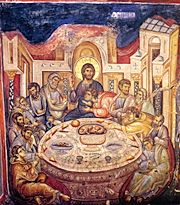On Weeding God’s Field
Chapter 13 of the Gospel of St Matthew is a treasury of parables. Several of them have to do with seeds and plants. I’d like to reflect a bit on the parable of the weeds and the wheat (vv. 24-30 and 36-43).
 This is a parable that has at times perplexed many (myself included). The main reason for this is, I think, the following. The weeds in the parable “are the sons of the evil one, and the enemy who sowed them is the devil.” Now Jesus is talking about people here, evil people, while the wheat, the “good seed” refers to good people, the “sons of the Kingdom.” The world is the field in which all these seeds have been sown, some by Christ and some by Satan.
This is a parable that has at times perplexed many (myself included). The main reason for this is, I think, the following. The weeds in the parable “are the sons of the evil one, and the enemy who sowed them is the devil.” Now Jesus is talking about people here, evil people, while the wheat, the “good seed” refers to good people, the “sons of the Kingdom.” The world is the field in which all these seeds have been sown, some by Christ and some by Satan.
Knowing this, we might wish to ask, along with the servants who were tending the Master’s field, if we shouldn’t just pull up the weeds so that the wheat can grow unhindered and unthreatened. The Master told the servants that if they pulled up the weeds, the wheat might be uprooted (I am reminded of Abraham’s dialogue with God over the fate of Sodom—would He destroy the good along with the evil?). So the conclusion was to let the weeds grow along with the wheat, and at harvest time they would be separated—the wheat going into the Master’s granary and the weeds into the fire.
The Master is taking a bit of a risk here. The weeds could possibly take over the whole field and choke off the majority of the wheat. Yet the Lord seems to be more patient than his servants in awaiting the final outcome. This seems to hold true even today. When we see evil we might wish to immediately uproot it (though if we find it in ourselves, we really should!). After all, did not St Paul say: “Drive out the wicked person from among you”? (1Cor. 5:13). That is rather hard to reconcile with Jesus’ “Let them grow together,” to be separated only on the Day of Judgment. Now it’s true that Jesus was presenting a general panorama of life in this world and Paul was dealing with a specific individual case. (And Jesus did say, “Every plant not planted by my heavenly Father will be uprooted,” though He didn’t say when. Obviously, those planted by the devil are not planted by the Father.)
We may simply have to accept that there is a “hierarchy of truth” in the Scriptures, i.e., while they are all inspired by the Holy Spirit, some are more important than others. Jesus said, for example, “Do not swear by Jerusalem” (which few people nowadays would be tempted to do anyway), and also “Do not commit adultery” (which way too many people do, to their ruin). We have to give the greater weight to the more important commandment. Likewise, the Church has always given pride of place to the Gospels, for the words of the incarnate Son of God are more profound than the words of the greatest saint, even St Paul (contra what some people seem to think!). So, acknowledging that there may be some cases in which it is truly God’s will to drive out evildoers from our midst or from positions from which they could do great harm to many (for Paul’s letters are still the word of God), we must take very seriously the Lord’s teaching on the weeds and the wheat.
When St John Chrysostom commented on this parable, he said that the Master allowed the weeds to grow along with the wheat in the hope that at least some of the weeds will become wheat. Now this doesn’t happen in nature, but we’re talking about people here. Evildoers can repent (and many have done so), and thus they are no longer children of the devil but of God’s Kingdom instead. St Peter says that God delays his coming—what Jesus calls the harvest—so that “all should reach repentance” (2Peter 3:9). This may very well be the reason that the wicked are allowed to remain on earth in the midst of the righteous.
There is also the possibility, tragically, that some of the wheat can become weeds through apostasy or perseverance in grievous sin. There are many factors involved, but our free will is one of the chief reasons why God doesn’t come in right away and apply the sickle.
But if the righteous are grieved, and even severely tried or persecuted, because the weeds are not yet uprooted, this does not mean that God is unjust. The day is coming when “The Son of Man will send his angels and they will gather out of his kingdom all causes of sin and all evildoers, and throw them into the furnace of fire… Then the righteous will shine like the sun in the Kingdom of their Father.” As Jesus remarked to some who were arguing with Him (see Jn. 8:34-47), they do the works of their father (the devil), so these will go to their father’s infernal kingdom, while those who follow Jesus will go to the Kingdom of the heavenly Father.
So this parable is a call to patience, to trust, and to perseverance in righteousness. We ought to pray patiently that the “weeds” of this world become “wheat” through repentance and faith. If God’s patience is for the sake of their salvation, ours should be too. We should also trust that no one ultimately gets away with anything before God. No one can be a “weed” all his life and escape the fires of Hell. There will be a final separation, but we have to let God take care of that. We must also do our utmost to persevere in doing God’s will, so that we, who consider ourselves “wheat,” might not end up as weeds through negligence and carelessness concerning habitual sins. Remember what St Paul said about the wild and cultivated olive branches (see Rom. 11:17-24).
Ultimately, it is a mystery, for we know that while weeds grow along with wheat, while evildoers live next door to the righteous, good people are going to get hurt, scandalized, defiled, even killed. God seems to save the majority of his rewards and punishments for the End, so that it often seems that evil prospers and righteousness suffers. So be it. He warned us that this would be the case, but that we should still rejoice, for our reward will be great in Heaven.
We still have to speak out against evil, and pray much, for this is part of the process of turning weeds into wheat. What we don’t want to do, however, is to return evil for evil, hatred for hatred, violence for violence, in the effort to weed the field. The Master is patient, yet uncompromising; merciful, but not naïve; loving, without ever backing down from the truth. Let us be like Him in this world, so that when justice is finally done, we will delight to find ourselves shining like the sun in the Kingdom of our Father.







